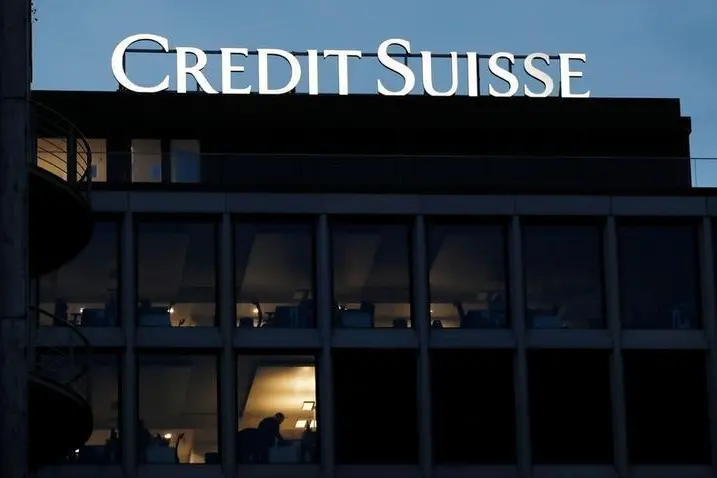PHOTO
ZURICH - Credit Suisse Group AG named asset management head Ulrich Koerner as its new chief executive on Wednesday and said it plans cost cuts as part of a strategic review, in the bank's latest efforts to recover from a series of scandals and losses.
The announcement is the culmination of months of pressure on current Chief Executive Thomas Gottstein over a tumultuous two-year tenure characterised by hammered shares and angry investors, some of whom had called for Gottstein to be replaced.
The bank has described 2022 as a "transition" year after costly scandals prompted a near-total reshuffle of management and a restructuring seeking to curtail risk-taking, particularly in its investment bank, while bulking up wealth management.
Credit Suisse, which posted a 1.59 billion Swiss franc ($1.65 billion) April-June loss - badly missing the 206 million francs consensus - has sought to dampen speculation that it could be acquired or broken up amid sector consolidation.
Chief Financial Officer David Mathers, when asked whether Credit Suisse might increase its capital after another quarterly loss, on Wednesday said the Swiss bank is well capitalised.
"I have been CFO for 12 years and I had much, much, much lower capital ratios than this in the course of my time so this does represent still one of the highest capital ratios," he said, noting the bank aimed to keep its CET1 capital ratio at 13% to 14% in the second half in an uncertain environment.
Its CET1 equity ratio stood at 13.5% of risk-weighted assets, hitting its near-term target of 13.5% and nearly at the 13.6% the market expected. That was below its 2024 target for above 14% and its first-quarter CET1 ratio of 13.8%.
"Our results for the second quarter of 2022 are disappointing, especially in the Investment Bank, and were also impacted by higher litigation provisions and other adjusting items," Gottstein said.
Gottstein's successor Koerner, who run's Credit Suisse's asset management unit, returned to the bank after a stint at UBS Group AG, where he most recently served as adviser to the CEO from 2019 to 2020. He ran UBS Asset Management from 2014 to 2019. Koerner was also previously a senior executive at Credit Suisse Financial Services and ran the Swiss business.
In June, executives said Credit Suisse may "temper" some of its key growth initiatives in wealth management as it focuses on a risk turnaround and bolstering technology.
Koerner, who used to work for McKinsey, is considered a restructuring expert in Switzerland.
The bank now plans to reduce its cost base to below 15.5 billion francs in the medium term versus an annualised 16.8 billion this year based on first-half numbers. More details on this were due with third-quarter results.
It had said in the past it aimed to bring cost savings forward, speeding up measures introduced as part of its reorganisation in November targeting 1.0 billion to 1.5 billion Swiss francs in annual structural cost savings by 2024.
It has said a technological overhaul could generate some 800 million francs in cost savings in the medium term, including 200 million francs in each of the years 2022 and 2023.
Mathers said the cost-cutting exercise would cover the entire group, not just the IT business. He gave no details on potential job cuts.
As part of the investment bank overhaul, Credit Suisse named David Miller and Michael Ebert as co-heads of the unit while the current chief, Christian Meissner, will focus on the strategic review.
Credit Suisse "will need time to solve its issues and regain the trust of all stakeholders over the next years," analyst Andreas Venditti at Vontobel wrote in a client note, adding that the investment bank review is the right focus for Koerner.
BALANCE SHEET
Reuters reported in May, citing two people with knowledge of the matter, that Credit Suisse was in the early stages of weighing options to bolster its capital after a string of losses eroded its financial buffers.
A cash injection would help the bank recover from billions of losses in 2021 and a series of costly legal headaches. Selling shares to some of its major existing investors was the preferred option, but Credit Suisse has not ruled out tapping all shareholders, the people said.
A sale of a business, such as Credit Suisse's asset management division, was also a possibility, although the bank had not decided on any potential action, the people said.
On Wednesday, the bank reaffirmed its commitment to asset management but said it was evaluating strategic options for its securitised products business to attract third-party capital.
SCANDALS
The bank is tightening controls after a swashbuckling approach to business triggered billions in losses via risk-management and compliance blunders.
Twin hits - a $5.5 billion loss on the default of U.S. family office Archegos Capital Management and the shuttering of $10 billion of supply chain finance funds linked to collapsed British financier Greensill - beset the bank in March 2021.
Credit Suisse was convicted last month of failing to prevent money-laundering by a Bulgarian cocaine trafficking gang in Switzerland's first criminal trial of one of its major banks. It is appealing the verdict.
The bank's shares have fallen more than 40% this year, touching a low below 5 francs in mid-July. Its market capitalisation is below 14 billion Swiss francs, Refinitiv data showed. The stock rose 0.4% after the morning bell before quickly reversing down 1.1%.
Swiss rival UBS on Tuesday posted a $2.1 billion second-quarter profit, smaller than expected as turmoil in financial markets hurt its investment banking and wealth management businesses.
($1 = 0.9614 Swiss francs)
(Reporting by Michael Shields and Maria Sheahan; Editing by Christopher Cushing)





















